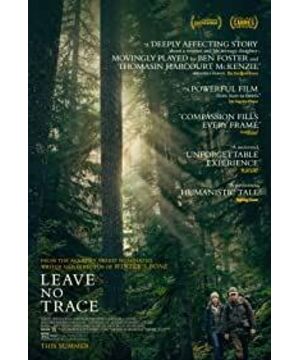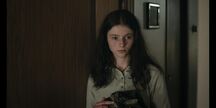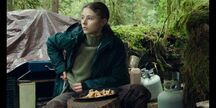We, the audience, are not comparable to the motives of the male protagonist, they are almost completely different
Possible question: Why is the father in the film so obsessed with living in isolation, away from any crowd?
In the film, PTSD is used to explain all the motivations of the father. In fact, this word is enough. The inhuman events that happened in the war can destroy everything in a person. From then on, there is an irreversible emotional pain. This kind of pain There is no way to compare, as others can only understand as much as possible, and it is difficult to fully empathize. He distanced himself from any group life, and in the end even left his own daughter after a hard choice.
However, when watching a movie, some audiences will have some resonance with the male protagonist. As ordinary people, there are often fantasies and urges to escape from everything in daily life. Of course most of it is not due to PTSD, the social and economic development of today is deeply rooted in the processes of globalization, post-Fordism and iconoclasticity that have shaped our post-modern social age; There is general anxiety and uncertainty, which further promotes the development of individualism, makes people more focused on the narrow world of the individual, and weakens the community life of the masses. As the audience, we and the actor's motivation are not comparable, almost completely different , and Leave No Trace does not dig into the "why" (although the audience will definitely think about this question), but uses the father's two departures to reflect a An ultra-individualistic "what" that has nothing to do with how others treat you, refusing to participate in any community. The two departures were compared with each other, and the state differences before and after each departure were also compared with each other.
There is some institutional coercion for first-time groups
They were caught in the park and forced to leave what their daughter thought was home, the humble but well-stocked shack they had been in for a long time, where she was happy and had fond memories. After being kicked out, both father and daughter were questioned by social workers about some uncomfortable questions. Although they were finally provided with a place to live, and the father also had a job, he had to endure the staff coming to the house every three days to care and fill in the questions. Endless form, everything is provided by others. His logging work is just an intuitive manifestation of human beings' natural invasion. The sound of helicopter flying may also cause some bad memories, and more importantly, he knows that their lives will be further invaded if they have With the mobile phone, the ubiquitous Internet will follow. At the same time, although the daughter met a friendly farm boy, her previous experience in the institution let her know, and she was worried about her getting along with other classmates after she entered school. How to make them understand her and her father's previous lifestyle?
The group that joined for the second time is full of the care of the small community
They left on the bus and hitchhiked after getting off the bus to further hide their whereabouts. They endured cold and starvation, and their daughter began to miss life on the farm. In fact, when they were on the farm, their father and daughter were not as good as when they lived in the park. The father almost died, the daughter asked someone to help, and they entered a camp. Compared with before, everything seemed to be in the dark. Their bohemian way of life is also far from modern society, music, beekeeping, mutual help, equal respect, and even a neighbor who has a similar experience and is in good condition, the method of healing him- Loaned their own dog to them. The girl was so moved by all these things that she tried to use the story of the bee to convince her father to stay, but in the end her father left.
At the same time, it tells the "how to". Not the future, not the past, not from the perspective of institutional improvement and social establishment, this film depicts how a person escapes from society right now. First of all, it is inevitable that the materials provided by the high-tech society are still needed. Moreover, wandering on the edge of the law, he will not go to prison, but he still needs to escape, not just stay away. Furthermore, he gave up part of the responsibility of parenting. Tom is not an adult, but she already has some knowledge and skills, the ability to learn, the ability to think independently, the ability to perceive the emotions of others, and the ability to love. . . . . . With a high probability, at this age and level, staying in the camp without a father will grow into a full and capable person. By and large, he did - escaped society. Also, the woman in the camp told the girl that there was another man in the forest, and there was more than one such man.
As said in the short review, the film maintains its neutrality and does not judge "should it". At the end, the two parted in the forest after hugging deeply. The girl went to hang the food bag and softly made that unique voice of her father's professor. "The" is another question that viewers will still ponder besides "why". Although modern collective life brings more sense of security and stability, it also emphasizes centralized central planning, hierarchical organizational structures, rigid and rigid occupational forms, and scientific management. People's sense of mistrust is escalating day by day; the importance of autonomy cannot be overstated. At the same time, for individuals, in many cases, people need the traditional protection and support functions of the consolation system. In short, the community is for fairness, and when the individual's ability is insufficient, collective assistance is provided. When the community pursues the concept of social justice and egalitarianism, it will inevitably adopt more and more coercive means in economic and social life.
Yan Fu translates "Liberty" as " authority of oneself ", and the goal of individualism and collectivism is "happiness", and where the boundary between the two should be set is an eternal problem in sociology. Outside of the movie, the problem at hand has not been resolved, so can we keep our own positions and let go of the individuals who are fleeing as in the movie?
View more about Leave No Trace reviews











